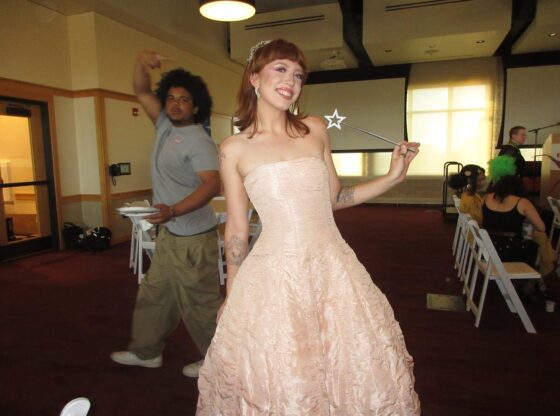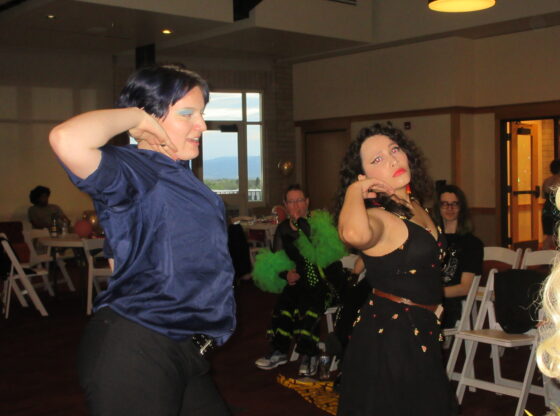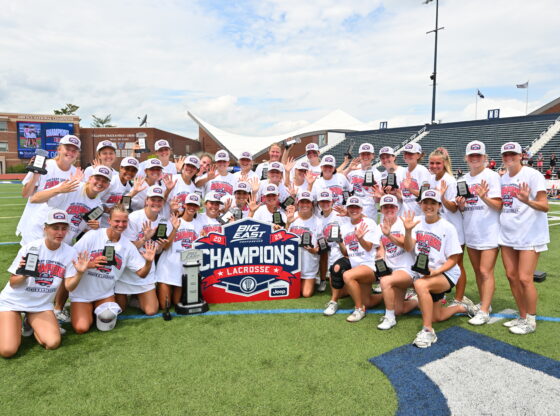Daryl Davis spoke last Wednesday in Davis Auditorium at about his journey as an African-American man who intermingled with the Ku Klux Klan in order to find out why the group hated people of his color of skin.
Davis, 49, is a professional pianist and public speaker. Although the subject of racism in America is a serious one, Davis managed to lighten the mood by injecting funny anecdotes or bits of conversations he had had with white supremacists into his presentation. Several times during the evening, the auditorium erupted into a roar of laughter. There were about 100 people in attendance and the crowd was very engaged.
Davis’ presentation was the final event in a three-week series of lectures, panels and other activities marking the life and legacy of Martin Luther King Jr.
Davis said that as a child he traveled the world because his parents worked for the U.S. Department of State and were posted to numerous embassies overseas, which made him “blind” to racism because he grew up in a multi-racial environment abroad. He has been to 50 different countries on five different continents around the world.
His first experience with racism came in 1968 when he was 10 and in fourth grade at a school in Belmont, Mass. He decided to join the Boy Scouts with some of his friends. In fact, he was the only African-American boy in the troop. In March, the troop was participating in the annual Paul Revere walk from Lexington to Concord and all of a sudden Davis began getting hit with miscellaneous items by bystanders. At the time, Davis said he didn’t know that he was the sole target until all the troop leaders began covering only him in protection. That night he talked to his parents about the day’s events and learned of racism for the first time.
The event that sent Davis onto the path he chose occurred five years later in 1974 when he was 15 and a sophomore in high school in Washington, D.C. One day two guest speakers came into Davis’ class. The speakers were in the American Nazi Party, one of whom was Nat Cole.
“Nat Cole pointed to me and the only other black kid in our class and said, ‘”We are going to ship you back to Africa,'” said Davis of his second encounter with overt racism. “From that day forward I had to find out what was behind racism.”
He began buying every book about racism and white supremacy that he could get his hands on. Davis spoke of how he wanted to fully understand the root of white supremacy so that he could effectively communicate with those who hated him.
In 1982, at the age of 23, Davis observed a Nazi Party rally across from the White House. He parked across the street and watched the members arrive and recognized Nat Cole. He went over to talk to Cole.
“I introduced myself and he shook my hand. I asked him if he remembered speaking to my high school class and he said yes. I then asked him why he tried to permanently arrange my travel plans for me,” Davis recalled.
Story continued on p. 4
Some years later, Davis began writing a book on the Ku Klax Klan and decided to make contact with Roger Kelly, who was the Imperial Wizard of the Klan. At that time the headquarters of the Klan were in Thurmont, Md., and many of the Klansmen frequented at a local bar. Davis learned that the first two booths on the left were reserved for Klansmen. Davis decided to try and find Kelly at this bar because he felt it was safer to approach Kelly in a public place.
Davis’s white female secretary, named Mary, went with him to the bar on a Sunday afternoon and no one was in the first two booths when Davis arrived so he decided to sit in one of the Klan’s booths and wait. He waited for a while and no Klansmen showed up, so he changed his tactic and requested that Mary call Kelly and set up an interview. The one catch was that Mary couldn’t tell Kelly that Davis was a black man, only that he was writing a book on the KKK. Kelly agreed to do the interview at a nearby motel. The room had a small entry area which enabled Davis to conceal his identity until the very moment the Klansmen entered. Mary answered the knock at the door and in walked a Night Hawk, a KKK term for a bodyguard, with the Klan insignia on his shirt and a gun on his hip. When the Night Hawk saw Davis he jumped back in shock and bumped into Kelly, who was behind him. The two men shook hands and did talk.
After the interview Davis began socializing with Kelly. It was the first time Kelly had ever socialized with a black man. They had dinner at each other’s houses, went to KKK meetings together and clan rallies.
However, when Davis finished his book on the Klan he could not find a publisher. “One publisher sent me a rejection letter that said, ‘Please send us a nonfiction, we are a non-fiction publishing company’,” said Davis with a chuckle.
As part of his presentation Davis showed several video clips, one of which was a CNN interview with Kelly and Davis about their somewhat “strange” relationship. Kelly said he respected Davis for being able to sit down and listen and converse with him even though they might not agree on everything. However, Kelly also mentioned that in no way did their friendship change his views on the separation of the races.
A few years ago, Kelly quit the Klan and Davis is the godfather of his first born daughter. Kelly gave Davis his Imperial Wizard robe and the two reunite occasionally.
Throughout his years researching and conversing with Klan members Davis has seen many members leave the Klan. He has also collected numerous artifacts such as T-shirts, robes and other Klan paraphernalia that Klan members have given him.
“People can change, they change through communication,” said Davis of his experience with the Klan. “We need to put out a universal message that no form of discrimination will be tolerated.”
His speech ended with a riveting piano performance and many questions from the audience. “I think it is an important message for everyone to hear,” said Will Whitmore a sophomore who came to the event on his own. “Just because you don’t talk about it doesn’t mean it doesn’t exist.”
Davis is the author of Klan-Destine Relationships: A Black Man’s Odyssey in the Ku Klux Klan that was published in 1999
He graduated from Howard University in 1980 with a bachelor of music degree. Davis has met and worked with many famous musicians such as Pinetop Perkins, Elvis Presley, Jerry Lee Lewis, Chuck Berry, Johnnie Johnson and Elton John. For more information about Davis you can visit his website at http://www.daryldavis.com/.










